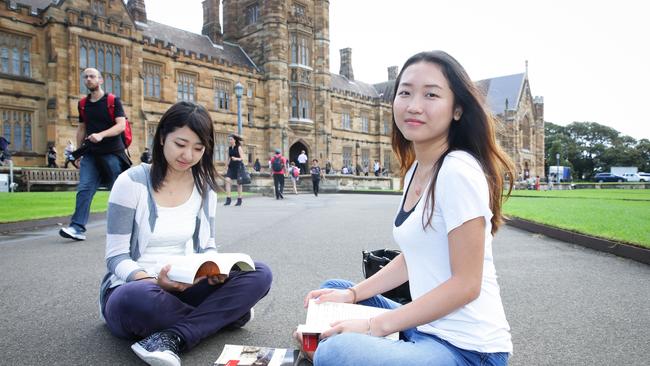Education and tourism to ride high on Trump’s orders
It’s not often that we get an opportunity to take the lead in a global industry, we need to grab it with both hands.

Surprising as it may seem, Australia is one of two world beneficiaries of tougher US visa and migration rules underlined by last night’s ban on a series of Middle Eastern countries.
I emphasise that this commentary is not passing judgment on the rights and wrongs of what the US (and the UK) is doing but merely to celebrate our good fortune and underline that there is more to Australia than the energy and other morasses created by our politicians.
Yesterday I was in the company of people from the tertiary education sector. Their eyes were sparkling — and that was before last night’s ban.
While there are no official numbers, they reckon overseas students studying tertiary courses in Australia in the 2017 calendar year are up in the vicinity of 20 per cent. That’s a huge rise because it comes on top of strong increases of around 15 per cent over the previous two years.
And it looks like the tourist numbers for 2017 are also going to show a sizeable rise. And out of those tourists comes even more demand for education from the children and grandchildren of travellers. The domestic flow on from these booms is staggering.
For example, it means that the massive over supply of small student apartments in Melbourne, many of which were bought off the plan by Chinese buyers who are now having trouble settling, has a real chance of being managed. The Crown high roller mess may also be manageable via executive chairman John Alexander’s tough line on costs and the influx of non-high roller tourists.
So, why has our education sector been such a big beneficiary of Donald Trump’s policies?
Let’s go back a few years when there were four big providers of English-language based tertiary education courses for the Asian, Indian and similar regional markets. The world leader was the US followed by the UK with Australia and Canada worthwhile players but coming up the rear. All four provide English-language degrees that are tickets to success in many areas of the global business world.
The UK has tightened its visa and entry requirements so it’s now a much lesser player in the market. The avalanche of adverse Trump publicity and the new American protectionist stance, along with questions over visas and entry, has suddenly made the US a far less attractive educational destination.
That leaves two in the market — Australia and Canada. Vancouver is doing very well but eastern Canada is cold and the time difference is a hindrance.
That leaves Australia as the top world educational destination.
In tourism, the New York tourist numbers are down thanks to Trump and I am sure that the Trump-driven downward thrust is being felt America wide. We are getting our share of the tourists that otherwise would have gone to the US. But Europe and other destinations will also be winning. Unlike English-based tertiary education there are many destinations to choose from.
As we saw with the high roller disaster, booms can be very dangerous. Any industry that is heading towards doubling over four or five years is in grave danger of getting it wrong. The Asian and Indian students pay large sums for an experience. They do not want to enter an overcrowded system where overseas students dominate all the classes.
As the number of overseas students rises not only is education quality put in jeopardy but it also stretches back up services. These are very solvable problems but will need to be addressed and the university sector is not known for its flexibility so a lot of work is required to make sure we don’t destroy our brand because we have not adjusted to the higher numbers.
But it’s a good problem to have. It’s not often the US hands Australia a world leading position in a global industry. We must take full advantage of it.







Thank you President Trump. Thank you US Secretary of State Rex Tillerson.